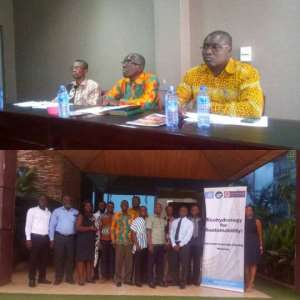
Accra, April 22, GNA - The United Nations Educational, Scientific and Cultural Organisation (UNESCO) has called for the harnessing of the contributions of science and innovation for water security.
Mr Tirso Dos Santos, the Head and Representative of UNESCO to Ghana, said the organisation was ready to support the process and to undertake a major action to strengthen water security for sustainable development.
He said water resources were unceasingly under severe pressure, largely due to anthropogenic or human factors and other global drivers.
He explained that this altered rainfall patterns, soil moisture and humidity.
Mr Dos Santos made these remarks in a speech read on his behalf at Prampram near Tema at the opening of a two-day stakeholder knowledge gathering workshop, dubbed "Ecohydrology for Sustainability".
The workshop was in line with one of UNESCO's inter-governmental programmes, the International Hydrological Programme (IHP), which was founded in 1975.
The Ecohydrology programme aims to advance the integration of social, ecological and hydrological research, and to generate outcomes that enable the development of effective policies and practices for integrated water resources management.
The IHP supports research, networking and capacity building initiatives is aimed at improving the understanding of the inter-linkages of ecohydrological processes at the catchment scale.
Mr Dos Santos said: "It is estimated that in the next 40 years, population growth and rapid urbanisation will create further pressures on water resources and will have a tremendous impact on the natural environment".
He said freshwater was a key resource for human health, prosperity and security.
"It is essential for poverty eradication, gender equality, food security and the preservation of ecosystems," he added.
"Yet billions of people worldwide are confronted with serious freshwater challenges, from water scarcity, poor quality, lack of sanitation and water-related disasters."
He noted that as Ghana transitioned from the Millennium Development Goals (MDGs) to the Sustainable Development Goals (SDGs), there was heightened call to manage water resources in a more sustainable manner.
"The SDGs cover a wide range of drivers across the three pillars of sustainable development, and include a dedicated goal on water and sanitation (SDG 6), that sets out to ensure availability and sustainable management of water and sanitation for all," Mr Dos Santos stated.
"Water and sanitation are the very core of sustainable development, critical to the survival of people and the environment.
"In achieving this goal, we need not only address the issues relating to drinking water, sanitation and hygiene, but also the quality and sustainability of water resources," he added.
Professor Kwabena Frimpong-Boateng, Minister of Environment, Science, Technology and Innovation, in a speech read on his behalf, said increasing the buffering capacity of the catchment of water bodies and reversing the environmental degradation that was impacting these water bodies was no mean task.
He said it required the understanding of various linkages, such as hydrology, ecology, sociology and economics.
Mr Ben Ampomah, the Executive Secretary, Water Resources Commission, said the Commission, in line with its mandate was committed to ensuring that the allocation and regulation of water resources was made on sound scientific and technical as well as legal considerations.
He said a decision support system was currently being tested and regulations administered to engender sound management decisions.
Dr Osmund Duodu Ansa-Asare, the Director, Water Research Institute of the Centre for Scientific and Industrial Research, in a speech read on his behalf, said increased agricultural production and the alleviation of poverty in various parts of Ghana, improvement of general health status and socio-economic development in general in the country were linked to sustainable water resource management.
"There is thus a strong growing interest to simultaneously consider the hydrological, ecological and sociological settings within which we find ourselves, vis-a-vis the water resources and the environment," he stated.
GNA
By Iddi Yire, GNA




 There’s nothing you can do for us; just give us electricity to save our collapsi...
There’s nothing you can do for us; just give us electricity to save our collapsi...
 Ghanaian media failing in watchdog duties — Sulemana Braimah
Ghanaian media failing in watchdog duties — Sulemana Braimah
 On any scale, Mahama can't match Bawumia — NPP Youth Organiser
On any scale, Mahama can't match Bawumia — NPP Youth Organiser
 Never tag me as an NPP pastor; I'm 'pained' the 'Akyem Mafia' are still in charg...
Never tag me as an NPP pastor; I'm 'pained' the 'Akyem Mafia' are still in charg...
 Your refusal to dedicate a project to Atta Mills means you never loved him — Kok...
Your refusal to dedicate a project to Atta Mills means you never loved him — Kok...
 2024 elections: I'm competent, not just a dreamer; vote for me — Alan
2024 elections: I'm competent, not just a dreamer; vote for me — Alan
 2024 elections: Forget NPP, NDC; I've the Holy Spirit backing me and nothing wil...
2024 elections: Forget NPP, NDC; I've the Holy Spirit backing me and nothing wil...
 2024 elections: We've no trust in judiciary; we'll ensure ballots are well secur...
2024 elections: We've no trust in judiciary; we'll ensure ballots are well secur...
 Performance tracker: Fire MCEs, DCEs who document Mahama's projects; they're not...
Performance tracker: Fire MCEs, DCEs who document Mahama's projects; they're not...
 Train crash: Railway ministry shares footage of incident
Train crash: Railway ministry shares footage of incident
